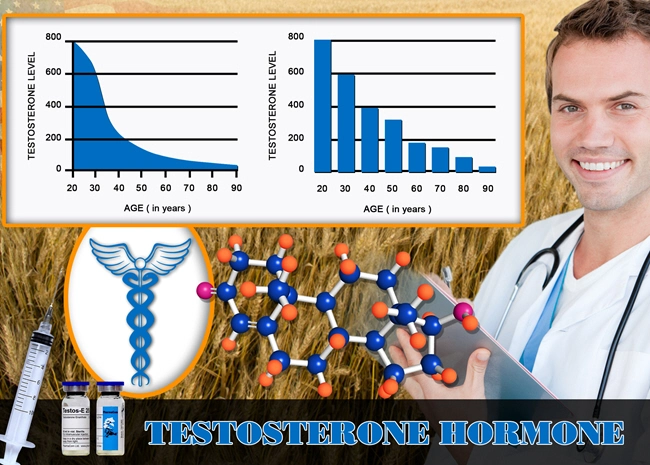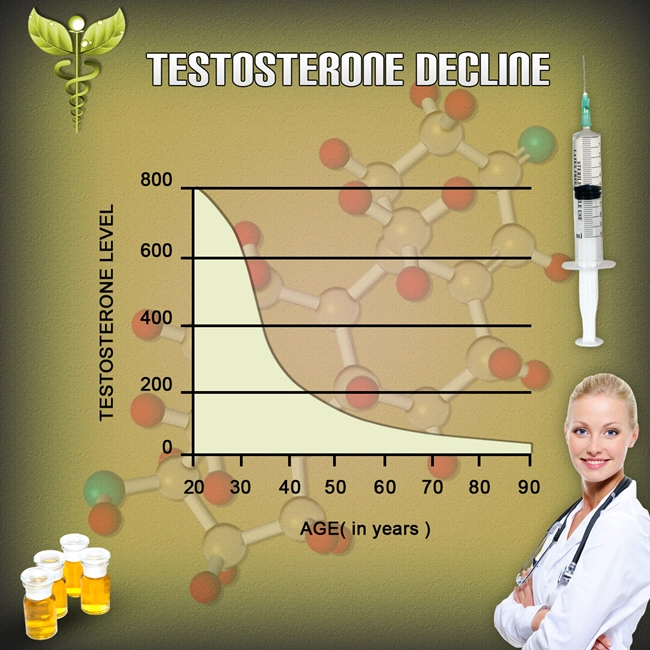
Introduction
Testosterone Propionate, a synthetic variant of the naturally occurring hormone testosterone, plays a pivotal role in the management of hypogonadism and other conditions related to testosterone deficiency in American males. As a short-acting ester of testosterone, it is often used in hormone replacement therapy (HRT) to swiftly elevate testosterone levels. However, its influence on the broader endocrine system, including potential disruptions to hormonal balance and the risk of endocrine disorders, warrants a comprehensive examination. This article delves into the effects of Testosterone Propionate on the endocrine health of American men, aiming to provide a nuanced understanding of its benefits and potential risks.
Mechanism of Action and Hormonal Balance
Testosterone Propionate functions by rapidly increasing the serum concentration of testosterone, which is crucial for maintaining muscle mass, bone density, and libido. The hormone binds to androgen receptors throughout the body, influencing a variety of physiological processes. While this can be beneficial for individuals with low testosterone levels, it also poses a risk of disrupting the delicate balance of the endocrine system. The hypothalamic-pituitary-gonadal (HPG) axis, responsible for regulating testosterone production, can be suppressed by exogenous testosterone, leading to a decrease in the body's natural production of the hormone. This phenomenon, known as hypogonadotropic hypogonadism, can result in long-term dependency on hormone therapy and potential complications such as infertility.
Impact on Endocrine Disorders
The administration of Testosterone Propionate may also influence the prevalence and management of various endocrine disorders. For instance, individuals with pre-existing conditions such as diabetes or thyroid disorders may experience exacerbated symptoms due to the hormone's metabolic effects. Testosterone can affect insulin sensitivity, potentially worsening glycemic control in diabetic patients. Similarly, the hormone's impact on thyroid function can lead to fluctuations in thyroid hormone levels, complicating the management of thyroid disorders. Therefore, careful monitoring and individualized treatment plans are essential for patients with concurrent endocrine conditions.
Cardiovascular and Metabolic Considerations
Beyond its direct effects on the endocrine system, Testosterone Propionate has implications for cardiovascular and metabolic health. Elevated testosterone levels have been associated with changes in lipid profiles, including increased levels of low-density lipoprotein (LDL) cholesterol and decreased levels of high-density lipoprotein (HDL) cholesterol. These alterations can contribute to an increased risk of atherosclerosis and cardiovascular disease. Additionally, the hormone's anabolic effects can lead to weight gain and alterations in body composition, further complicating metabolic health. American males considering Testosterone Propionate therapy must be aware of these potential risks and engage in regular health screenings to mitigate them.
Psychological and Behavioral Effects
The psychological and behavioral impacts of Testosterone Propionate are also significant, as the hormone influences mood, cognition, and aggression. While some men report improved mood and increased energy levels with testosterone therapy, others may experience mood swings, irritability, or even aggression. These effects can have profound implications for mental health and interpersonal relationships. It is crucial for healthcare providers to assess the psychological well-being of patients undergoing testosterone therapy and provide appropriate support and interventions as needed.
Conclusion
Testosterone Propionate offers a valuable therapeutic option for American males with testosterone deficiency, yet its impact on the endocrine system and overall health is multifaceted. The potential for hormonal imbalance, exacerbation of endocrine disorders, and cardiovascular and metabolic risks necessitates a cautious and informed approach to its use. By understanding the comprehensive effects of Testosterone Propionate, healthcare providers can better tailor treatment plans to optimize the health and well-being of their patients. As research continues to evolve, ongoing education and vigilance will be key to maximizing the benefits of this hormone while minimizing its risks.
Contact Us Today For A Free Consultation
Dear Patient,
Once you have completing the above contact form, for security purposes and confirmation, please confirm your information by calling us.
Please call now: 1-800-380-5339.
Welcoming You To Our Clinic, Professor Tom Henderson.

- Testosterone Propionate: Benefits, Risks, and Hormonal Balance for American Males [Last Updated On: March 17th, 2025] [Originally Added On: March 17th, 2025]
- Testosterone Propionate's Impact on Cognitive Function in American Males: Benefits and Risks [Last Updated On: March 17th, 2025] [Originally Added On: March 17th, 2025]
- Testosterone Propionate: Enhancing Male Fertility in American Men - Benefits and Risks [Last Updated On: March 18th, 2025] [Originally Added On: March 18th, 2025]
- Testosterone Propionate in American Sports: Ethical Issues and Health Risks for Male Athletes [Last Updated On: March 18th, 2025] [Originally Added On: March 18th, 2025]
- Testosterone Propionate's Role in Male Pattern Baldness Among American Men [Last Updated On: March 18th, 2025] [Originally Added On: March 18th, 2025]
- Testosterone Propionate: Enhancing Sleep Quality in American Men [Last Updated On: March 19th, 2025] [Originally Added On: March 19th, 2025]
- Testosterone Propionate's Role in Weight Management for Obese American Males [Last Updated On: March 20th, 2025] [Originally Added On: March 20th, 2025]
- Testosterone Propionate: Benefits, Risks, and Ethical Use in American Men [Last Updated On: March 20th, 2025] [Originally Added On: March 20th, 2025]
- Long-Term Health Risks of Testosterone Propionate Use in American Men [Last Updated On: March 21st, 2025] [Originally Added On: March 21st, 2025]
- Testosterone Propionate's Impact on Immune Function in American Males: A Comprehensive Review [Last Updated On: March 21st, 2025] [Originally Added On: March 21st, 2025]
- Testosterone Propionate: Boosting Energy Levels in American Men [Last Updated On: March 21st, 2025] [Originally Added On: March 21st, 2025]
- Testosterone Propionate: A Promising Therapy for Osteoporosis in American Men [Last Updated On: March 21st, 2025] [Originally Added On: March 21st, 2025]
- Testosterone Propionate: A Promising Treatment for Depression in American Males [Last Updated On: March 22nd, 2025] [Originally Added On: March 22nd, 2025]
- Testosterone Propionate: Benefits, Risks, and Use in American Male Bodybuilding [Last Updated On: March 22nd, 2025] [Originally Added On: March 22nd, 2025]
- Testosterone Propionate: A Promising Treatment for Chronic Pain in American Men [Last Updated On: March 22nd, 2025] [Originally Added On: March 22nd, 2025]
- Testosterone Propionate: Benefits, Risks, and Aesthetic Use in American Males [Last Updated On: March 22nd, 2025] [Originally Added On: March 22nd, 2025]
- Testosterone Propionate: A Promising Treatment for Obesity in American Males [Last Updated On: March 23rd, 2025] [Originally Added On: March 23rd, 2025]
- Testosterone Propionate Use and Diabetes Risk in American Males: A Comprehensive Analysis [Last Updated On: March 23rd, 2025] [Originally Added On: March 23rd, 2025]
- Testosterone Propionate: Psychological Effects and Risks for American Men [Last Updated On: March 23rd, 2025] [Originally Added On: March 23rd, 2025]
- Testosterone Propionate: A Promising Treatment for Chronic Fatigue in American Males [Last Updated On: March 23rd, 2025] [Originally Added On: March 23rd, 2025]
- Testosterone Propionate: Enhancing Muscle, Energy, and Psychological Health in American Men [Last Updated On: March 24th, 2025] [Originally Added On: March 24th, 2025]
- Testosterone Propionate's Cardiovascular Impact on American Men: Benefits, Risks, and Guidelines [Last Updated On: March 24th, 2025] [Originally Added On: March 24th, 2025]
- Testosterone Propionate: Enhancing Libido and Sexual Performance in American Men [Last Updated On: March 24th, 2025] [Originally Added On: March 24th, 2025]
- Testosterone Propionate: Enhancing Muscle Recovery in American Men - Benefits and Risks [Last Updated On: March 24th, 2025] [Originally Added On: March 24th, 2025]
- Testosterone Propionate: Enhancing Recovery and Performance in American Male Athletes [Last Updated On: March 24th, 2025] [Originally Added On: March 24th, 2025]
- Testosterone Propionate: Benefits and Risks in Hormone Replacement Therapy for American Males [Last Updated On: March 25th, 2025] [Originally Added On: March 25th, 2025]
- Testosterone Propionate: A Promising Treatment for Anemia in American Men [Last Updated On: March 25th, 2025] [Originally Added On: March 25th, 2025]
- Testosterone Propionate: Benefits, Risks, and Legal Issues for American Men [Last Updated On: March 25th, 2025] [Originally Added On: March 25th, 2025]
- Testosterone Propionate Use and Liver Health Risks in American Males [Last Updated On: March 25th, 2025] [Originally Added On: March 25th, 2025]
- Testosterone Propionate's Impact on Bone Health in American Men: A Comprehensive Analysis [Last Updated On: March 25th, 2025] [Originally Added On: March 25th, 2025]
- Testosterone Propionate's Impact on Blood Pressure in American Men: A Comprehensive Analysis [Last Updated On: March 25th, 2025] [Originally Added On: March 25th, 2025]
- Testosterone Propionate: Enhancing Sexual Function in American Men [Last Updated On: March 26th, 2025] [Originally Added On: March 26th, 2025]
- Testosterone Propionate: Enhancing Joint Health in American Men [Last Updated On: March 26th, 2025] [Originally Added On: March 26th, 2025]
- Testosterone Propionate: Enhancing Sexual Health in American Men - Benefits and Risks [Last Updated On: March 26th, 2025] [Originally Added On: March 26th, 2025]
- Testosterone Propionate: Enhancing Endurance in American Men - Benefits and Risks [Last Updated On: March 26th, 2025] [Originally Added On: March 26th, 2025]
- Testosterone Propionate's Impact on Immune System in American Men: Risks and Benefits [Last Updated On: March 26th, 2025] [Originally Added On: March 26th, 2025]
- Testosterone Propionate: A Promising Treatment for Muscle Wasting in American Males [Last Updated On: March 26th, 2025] [Originally Added On: March 26th, 2025]
- Testosterone Propionate: Benefits, Risks, and Legalities for American Weightlifters [Last Updated On: March 26th, 2025] [Originally Added On: March 26th, 2025]
- Testosterone Propionate: A Promising Stress Management Solution for American Men [Last Updated On: March 26th, 2025] [Originally Added On: March 26th, 2025]
- Testosterone Propionate's Impact on Cholesterol Levels in American Men: Cardiovascular Risks [Last Updated On: March 26th, 2025] [Originally Added On: March 26th, 2025]
- Testosterone Propionate in Anti-Aging: Benefits, Risks, and Clinical Insights for American Men [Last Updated On: March 26th, 2025] [Originally Added On: March 26th, 2025]
- Testosterone Propionate: Boosting Energy in American Men with Low Testosterone [Last Updated On: March 27th, 2025] [Originally Added On: March 27th, 2025]
- Testosterone Propionate: Managing Hormonal Imbalances in American Men [Last Updated On: March 27th, 2025] [Originally Added On: March 27th, 2025]
- Testosterone Propionate's Impact on Mood Swings in American Men: Benefits and Risks [Last Updated On: March 27th, 2025] [Originally Added On: March 27th, 2025]
- Testosterone Propionate: A Promising Treatment for Low Sperm Count in American Males [Last Updated On: March 27th, 2025] [Originally Added On: March 27th, 2025]
- Testosterone Propionate: Enhancing Strength and Performance in American Men [Last Updated On: March 28th, 2025] [Originally Added On: March 28th, 2025]
- Testosterone Propionate: Uses, Benefits, and Risks in Male Hormone Therapy [Last Updated On: March 29th, 2025] [Originally Added On: March 29th, 2025]
- Testosterone Propionate: Uses, Benefits, and Risks for American Men's Health and Fitness [Last Updated On: March 29th, 2025] [Originally Added On: March 29th, 2025]
- Testosterone Propionate: Cardiovascular Effects and Risks in American Men [Last Updated On: March 29th, 2025] [Originally Added On: March 29th, 2025]
- Testosterone Propionate: Benefits, Dosage, and Risks for American Men's Muscle Building [Last Updated On: March 30th, 2025] [Originally Added On: March 30th, 2025]
- Testosterone Propionate: Enhancing Mental Health in American Men - Benefits and Risks [Last Updated On: March 30th, 2025] [Originally Added On: March 30th, 2025]
- Testosterone Propionate: Enhancing Sexual Health and Performance in American Men [Last Updated On: March 30th, 2025] [Originally Added On: March 30th, 2025]
- Testosterone Propionate: Enhancing Hormonal Health in American Men [Last Updated On: March 31st, 2025] [Originally Added On: March 31st, 2025]
- Testosterone Propionate: Enhancing Bone Density in American Men [Last Updated On: April 2nd, 2025] [Originally Added On: April 2nd, 2025]
- Testosterone Propionate's Impact on Emotional Health in American Men [Last Updated On: April 2nd, 2025] [Originally Added On: April 2nd, 2025]
- Testosterone Propionate in Sports: Benefits, Risks, and Ethical Dilemmas for American Athletes [Last Updated On: April 4th, 2025] [Originally Added On: April 4th, 2025]
- Testosterone Propionate: Enhancing Strength and Risks for American Men [Last Updated On: April 5th, 2025] [Originally Added On: April 5th, 2025]
- Testosterone Propionate: A Potential Treatment for Fatigue in American Males [Last Updated On: April 5th, 2025] [Originally Added On: April 5th, 2025]
- Testosterone Propionate: Benefits, Risks, and Uses in American Men's Health and Fitness [Last Updated On: April 6th, 2025] [Originally Added On: April 6th, 2025]
- Testosterone Propionate: A Fast-Acting Solution for Muscle Loss in American Males [Last Updated On: April 7th, 2025] [Originally Added On: April 7th, 2025]
- Testosterone Propionate: Enhancing Sexual Desire and Function in American Men [Last Updated On: April 8th, 2025] [Originally Added On: April 8th, 2025]
- Testosterone Propionate: Enhancing Strength Training in American Men - Benefits and Risks [Last Updated On: April 8th, 2025] [Originally Added On: April 8th, 2025]
- Testosterone Propionate's Impact on Cardiovascular Health in American Men: Risks and Mitigation [Last Updated On: April 10th, 2025] [Originally Added On: April 10th, 2025]
- Testosterone Propionate: Psychological Impacts and Benefits for American Men [Last Updated On: April 10th, 2025] [Originally Added On: April 10th, 2025]
- Testosterone Propionate: Enhancing American Men's Health Through Hormone Replacement Therapy [Last Updated On: April 11th, 2025] [Originally Added On: April 11th, 2025]
- Testosterone Propionate: Benefits, Administration, and Considerations for American Men's HRT [Last Updated On: April 12th, 2025] [Originally Added On: April 12th, 2025]
- Testosterone Propionate: Effects, Risks, and Reproductive Health Impact in American Men [Last Updated On: April 13th, 2025] [Originally Added On: April 13th, 2025]
- Testosterone Propionate: Enhancing Sports Performance and Associated Risks for American Athletes [Last Updated On: April 14th, 2025] [Originally Added On: April 14th, 2025]
- Testosterone Propionate: Enhancing Mood and Cognition in American Men [Last Updated On: April 15th, 2025] [Originally Added On: April 15th, 2025]
- Testosterone Propionate: A Promising Therapy for Sarcopenia in Aging American Males [Last Updated On: April 15th, 2025] [Originally Added On: April 15th, 2025]
- Testosterone Propionate: Benefits, Risks, and Ethical Use in Men's Health [Last Updated On: April 16th, 2025] [Originally Added On: April 16th, 2025]
- Testosterone Propionate: Enhancing Bone and Joint Health in Aging American Men [Last Updated On: April 16th, 2025] [Originally Added On: April 16th, 2025]
- Testosterone Propionate: Cardiovascular Benefits and Risks in American Men [Last Updated On: April 18th, 2025] [Originally Added On: April 18th, 2025]
- Testosterone Propionate: Enhancing Performance and Risks for American Men [Last Updated On: April 18th, 2025] [Originally Added On: April 18th, 2025]
- Testosterone Propionate: A Promising Treatment for Lethargy in American Males [Last Updated On: April 18th, 2025] [Originally Added On: April 18th, 2025]
- Testosterone Propionate in Men's Health: Benefits, Risks, and Administration in the US [Last Updated On: April 19th, 2025] [Originally Added On: April 19th, 2025]
- Testosterone Propionate: Enhancing Sexual Vitality and Risks in American Men [Last Updated On: April 19th, 2025] [Originally Added On: April 19th, 2025]
- Testosterone Propionate: Enhancing Emotional Well-being in American Men [Last Updated On: April 20th, 2025] [Originally Added On: April 20th, 2025]
- Testosterone Propionate: Enhancing Muscle Growth and Performance in American Males [Last Updated On: April 21st, 2025] [Originally Added On: April 21st, 2025]
- Testosterone Propionate: Enhancing Libido in American Males - Benefits and Risks [Last Updated On: April 22nd, 2025] [Originally Added On: April 22nd, 2025]








